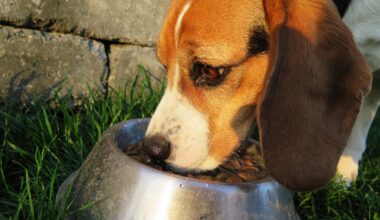When to Avoid Vaccinating Your Dog: Health Considerations
Vaccination is a vital part of a dog’s healthcare plan, protecting them against various diseases. However, there are circumstances when it might not be advisable to vaccinate your dog. One significant reason against vaccination is if your dog is ill. Vaccinating a sick dog could lead to complications and worsen their condition. A veterinary visit is critical if your dog exhibits symptoms like fever, vomiting, or lethargy. Another essential consideration is age. Puppies have developing immune systems, making timing crucial for vaccinations. Conversely, older dogs may experience side effects or adverse reactions due to their health status. Furthermore, if your dog has a history of severe allergy reactions or an immune-mediated disease, discussing vaccination options with your veterinarian is crucial. Additionally, if your dog is undergoing specific treatments, such as chemotherapy, vaccination timing needs adjustment. Correspondingly, dual vaccination in homes with dog breeds sensitive to reactions should be approached cautiously. Lastly, if your dog recently received an exposure to a particular illness, that may further delay vaccination in order to avoid complications. Consulting your vet for tailored guidance is paramount.
Another important aspect involves understanding your dog’s overall health status. If your dog has a chronic health condition, it may not be wise to proceed with vaccinations at that moment. Conditions such as diabetes, liver disease, or kidney problems can compromise their ability to handle vaccine components. Moreover, your vet might recommend a delay until your dog’s health stabilizes. Also, pregnant or nursing dogs should be considered carefully. Vaccinating a pregnant dog can pose risks to the developing puppies. Consequently, postponing vaccinations until the puppies are weaned is often the best practice. Furthermore, it’s also a good idea to avoid unnecessary stress by determining your dog’s current health conditions. By doing so, you can ensure that your dog is vaccinated only when in optimal condition. Older dogs with pre-existing conditions or sensitivities need special attention during their vaccination cycle. Vet assessments are essential to judge whether vaccinations should proceed or be modified. Lastly, supporting your dog after vaccination with proper care is equally vital, promoting recovery and avoiding side effects.
Recognizing Signs of Illness that Delay Vaccination
Recognizing the signs of illness is essential for determining if your dog should receive vaccinations. Common signs that indicate an ill dog include changes in appetite, lethargy, unusual behavior, or gastrointestinal disturbances. If you notice any of these symptoms, it’s crucial to seek veterinary advice. Urgent conditions can escalate quickly, and delaying treatment can worsen outcomes. Minor canine illnesses may delay vaccination due to the dog being unable to process the vaccine properly. This directly ties into ensuring your dog’s immune system is functioning optimally before proceeding. Moreover, if your dog is diagnosed with infectious diseases, such as kennel cough, early diagnosis and management are key to recovery. Introducing vaccination shortly after may inadvertently overwhelm their system. The same applies to vaccinations’ timing against potential illnesses or exposure risks; proper assessment of their current health situation is imperative. Always keep an eye on any peculiar behaviors or signs since early detection may indicate a problem requiring immediate attention. Your dog’s well-being is paramount, and that may sometimes mean having to delay vaccinations to ensure the longevity of their health.
A vital consideration during the vaccination process is maintaining consistent communication with your veterinarian. When in doubt about vaccinating your dog, it’s advisable to trust your vet’s expertise. Your veterinarian understands the specific needs of your dog better than you might. They will assess every factor, including medical history and ongoing health conditions. Establishing a solid relationship and respect for your vet’s advice can save you and your pet a lot of trouble down the line. Additionally, they can provide further educational resources regarding vaccine types, dosages, and their possible side effects. Your veterinarian can facilitate personalized vaccine plans based on your dog’s lifestyle, age, and health profile. This approach is crucial, especially for dogs frequently interacting with other pets. Furthermore, participating in wellness exams should be part of your routine. Such assessments provide the necessary health evaluations that ensure vaccinations are administered when appropriate. Ultimately, being proactive leads to better health outcomes, reducing any risk surrounding vaccinations. A cohesive plan between you and your veterinarian ensures comprehensive management of your dog’s health.
Understanding Vaccine Interactions and Myths
Another essential factor when considering dog vaccinations is understanding vaccine interactions and debunking myths. Some pet owners might hesitate due to misconceptions surrounding the side effects of vaccines. Myths about vaccines causing autism or other long-term health problems are unfounded and can jeopardize a dog’s health. Vaccination is generally low-risk, with only a small percentage experiencing transient side effects. Understanding that some dogs may develop mild reactions, such as soreness or lethargy post-vaccination, is also vital. These signs typically resolve quickly, indicating the immune system’s response. On the other hand, serious side effects are rare but could occur, especially in dogs with prior allergic reactions. Therefore, informing your veterinarian about your dog’s health history significantly aids them in making the best vaccination decisions. Moreover, some vaccines require specific intervals for effectiveness; thus, following up with your veterinarian’s scheduling advice is crucial. Additionally, proper identification and understanding of any breed-specific vaccination needs can further mitigate risks associated with vaccines and ensure that your dog remains protected against common diseases.
Despite the numerous benefits of vaccinations, there are several key health considerations that may lead to avoiding them at certain times. Notably, understanding your dog’s immune system is paramount. Each dog’s immune response varies, influenced by factors such as genetics and health conditions. Thus, vaccines designed to strengthen immunity may not work properly if administered during periods of suppressed immune function. Therefore, take note of any ongoing treatments that may affect immunity. These treatments can include immunosuppressive drugs or therapies that inhibit your pet’s immune response. In such cases, consult your veterinarian when to resume vaccinations to avoid adversely affecting your dog’s health. Vaccination protocols should always be evaluated regularly, adapting them to any changes in your dog’s status or health concerns. Additionally, certain breeds are genetically predisposed to adverse reactions to specific vaccines due to their unique characteristics. Identifying these breeds and discussing tailored vaccination strategies with your veterinarian is crucial to reduce the occurrence of negative effects. Always keep open communication and prepare for any immediate adverse reactions after vaccination.
Conclusion: Consulting Your Veterinarian
In conclusion, it is crucial to consult your veterinarian when considering vaccinations for your dog. Given the number of factors influencing health status, seeking professional guidance ensures that you protect your dog from preventable diseases while avoiding unnecessary risks. Keep in mind that not all dogs are the same; hence, personalized plans to meet your dog’s individual needs are paramount. If you notice any unusual signs or suspect illness, refrain from vaccinating and prioritize your dog’s health instead. Also, be aware of the importance of scheduling vaccinations during times that best suit your dog’s health. This proactive approach establishes a foundation for effective long-term health care and disease prevention. Ultimately, ensuring that your dog receives proper vaccinations at the right time requires vigilance, understanding, and timely communication. Being informed empowers pet owners to make decisions that ensure the well-being and longevity of their beloved pets. Keeping a close relationship with your veterinarian can lead to healthier outcomes for your dog, making it crucial for responsible pet ownership.
In light of the aforementioned considerations, navigating the complex world of dog vaccinations requires diligence. By understanding the appropriate contexts for avoiding vaccinations, pet owners can provide the best care for their dogs. Following established best practices protects pets from serious infections while fostering a stronger bond with them. Remember to stay proactive, informed, and always prioritize the health needs of your loyal companion.


